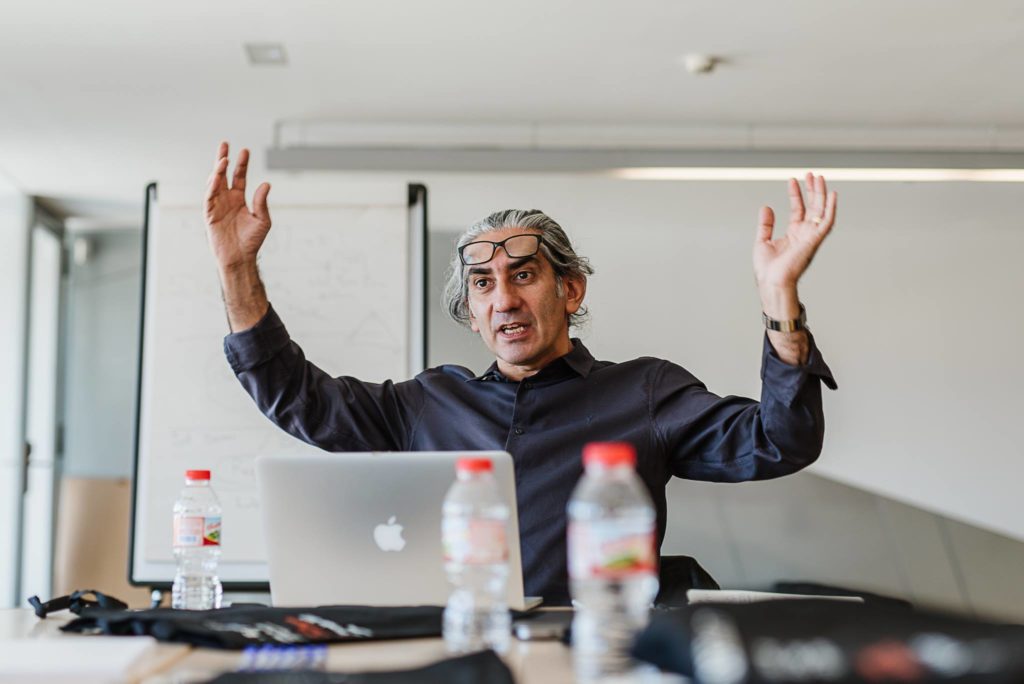Blog Post
Failure is the stone to build the road to success and innovation
Today I would like to share with you some most interesting interaction I had with a number of experts around the globe, discussing failure, the culture of making mistakes and permitting mistakes becoming the trigger for innovation.

No wonder our senior managers and leaders often fear to provide us with the environment where failure is not only not punished, but even welcomed and celebrated! I do have sympathy and we should show understanding. After all failure is the word used around 19th century to describe bankruptcy. So “If my team fails, my company goes bankrupt”.
One of my great friends, Professor Lawrence Zeegen, who is the dean of design at Ravensbourne calls failure and mistakes “happy accidents” and he emphasizes why it is highly important for us to permit and give room to mistakes within the process of creativity, any learning or aiming for innovative design and thinking.
Nothing succeeds like failure!
To start with, let’s agree on one thing: Nothing succeeds like failure! I want you to stop reading this and grab a piece of paper and a pencil (or a pen, whatever you can draw with, so give me no excuse at this stage). Use the hand you don’t draw with and hold it in a pose. And give yourself 30 second. And draw your hand as good as you can. A 30 second drawing. Now switch your hands and draw the same pose of the other hand with the hand your are not comfortable with, again in 30 seconds. How does it look like? Is it too far from your expectations of a good quality work? Do you call it a failure? Is the production with your weaker hand so good that despite the poor quality you would call it a success?
We define the value of failure ourselves. The great example of it is Steve jobs. Do you remember as he left Apple in the 1990s? he started to support a software company and in fact the organisation very quickly started to fail!! And what do you think what his solution was? He did not try to push marketing and sales effort, instead he became his own client and as a result a little company was born I am sure you all heard of it. Yes, those who guessed right, bravo! It was Pixar.
We define the value of failure ourselves.
And those who failed guessing it right: WHO CARES, YOU FAILED, SO WHAT? You now know it and learned something and would know it next time! So, well done!!
Let me give you the next very little task: do you have any people in your organization whom you would consider as successful in what they are doing? I don’t mind if you would pick a manager, someone from the leadership, someone among yourself and in your department, a designer maybe. Take couple of minutes and interview them. Ask them to give you one story of their failure and I bet with you there will be the part of the story how they paid special attention to that. And you know what: we all have them. You know why: the key to success always lies in how you turn the failure into foundation of next move upwards instead of functioning as roadblocks.
So one lesson for us should be: every obstacle is an opportunity. It is a matter of perspective. So what you make out of any situation, is what it becomes to you.
I would like to take it one step further and recommend: if you fail, fail big and fast. It needs to become visible and potentially even hurt. Only this way you can get up quickly and learn from it and move on. So:
Fail, Fail Fast and Fail Big! we now only need to make sure your managers, your leaders and superiors understand and agree to the value of failure and give you room, space and the opportunity to fail. And at the same time, we shall understand that the permission to fail does not mean we are allowed to become irresponsible and lose control.
From failure to innovation
Creativity is about daring and failing. it is the art of failing I would even say. And innovation needs creativity, including the daring and failing components. Great companies will have not much of choices if they want to become more and more innovative but embracing failure. I think it was Lewis Schiff who said that innovation is not the result of new ideas. He even claims it is not about creativity but much more about better execution. And that I tell you, includes a number of rounds of failures, mistakes and yet being determined to go on and not giving up.
Faris Yakob uses the slogan GENIUS STEALS. You should read his book “Paid Attention”
Faris concept on genius steals tries to make us understand that there is no “new and never seen before idea”. It is a series of testing and failing, using already existing ideas, what we try to shift and change and convert until we come up with something what looks unique and exciting, something we would call innovation. So back to my example of Steve Jobs, let’s not forget: Microsoft Windows was built on Apple’s ideas, and Apple built their ideas by stealing from Xerox. Genius, right?
Creativity is about daring and failing.
A writer I have not met personally but heard much about, is Sarah Lewis who wrote her newest book on creativity and failure. The book is called “The Rise” and is about failure being a gift, a present what helps us on our path to become masters in what we do, specially if we are in the business of creativity and design. It is interesting to see how she examines the lives of different people, from artists, entrepreneurs, scientists and observes how these people use their failures and disappointments to learn from it, to grow and to finally succeed.
Have you ever experienced the same? Isn’t that probably the case that many of you, if not everyone of you, in your personal life have the same experience, make mistakes and learn from it? Do you transfer and apply these insights to your business life? With the same intensity and freedom? If you don’t, why not? Is it a matter of responsibility? Is that because in personal life, your failure might not damage anyone but yourself and back in business you might have people around you, from colleagues to superiors, who would become disappointed of you? You might lose face, right? You might even risk losing job! And yet imagine, if that failure and making mistake would lead into some great insight and learning, and help you to innovate and come up with some great design or of a grand sales and marketing idea in a new environment, you would be massively celebrated, right?
What I am trying to say is: Failure is a matter of perspective. Some of us looks at it as a mistake what causes damage and that consequences should be executed. We might lose salary, bonus or reputation and more. Some other, specially successful people or corporations and those who promote success measure themselves against goals they don’t meet and are therefore considered failures.
What I am trying to say is: Failure is a matter of perspective.
Now let’s discuss how this type of healthy failure is implemented in our organization. Of course taking it for granted that our leadership is permitting the exercise and is happy with us turning the organization into a learning and innovative environment.
Let’s think of your most recent effort that fell flat. What can it tell you? How can you use it to aim for a new goal, or move closer to the original vision? In fact, since you are great at what you do and are experts, in order to embrace failure and allow yourself to make mistakes you need to become “deliberate amateurs”.
If the above does not relate to you, what is the process you usually follow to reach the top result, at your work? Any concept what secures you the top result with no risk of making mistake on your road to your final destination?
There are too many businesses that eliminate the opportunities for their employees to become deliberate amateurs, asking the questions that can lead to truly disruptive innovation. So let’s have your company coming that far to say “We incentivize creativity and innovation by reducing the cost of failure, by creating safe spaces for exploration.”
Professor Lawrence Zeegen sometimes asks this simple question to his participants:
can you tell what the following have in common: Penicillin, Post-It notes, Velcro (google this one, a real fun story), the Slinky (I guess you need to google this one too if you are not American), and Coca-Cola.
Yes, they are all happy accidents, results of unintentional outcomes, while aiming for other targets and therefore considered as failures.
So how come we always ask for perfection and never welcome mistakes? Is that not already the reason why we are so afraid of failures? Lawrence explains “well, we want the predictable, because designing beautiful things is calculated and charged at an hourly rate and dead-ends and wrong-turnings cannot be charged for. This is why successful companies who permit failure becoming part of their culture, include a line in their P&L”
I actually advise my clients to have this line too and I call it Burn Money. So YES! you need to have the right environment, freedom, trust and back up to make mistakes.
Professor Lawrence Zeegen is also reminding of the cultural aspect and I realize that there are countries where failure leads to losing face and more. Saichiro Honda says “success is 99% Failure”. And that part of it is painful and embarrassing. Isn’t that called Seppuku, the ritualised suicide in japan, when they fail? And isn’t this maybe an exaggerated picture of the feeling in all of us, what makes us deny our mistakes rather than learning from them?
If I were you , I would stand up right now and do something really difficult, something you are sure you will fail performing. And see what it feels like.
Here are some food for thoughts (major thanks to Professor Lawrence Zeegen) what I’d like to share with you to close this rather long article:
– Mistakes should become your portal of discovery.
– Fail, try again, fail again, fail better.
– Call your mistakes “experience”.
– Failure will give your success its flavour.
– Mistakes enable you to learn more quickly and lead new directions
– if something goes wrong beyond your expectations, get some new insights and benefit of it. This will exceed by far the costs.
My last words can only be: HAPPY FAILING!
-

Jamshid Alamuti
CEO and Co-Founder of Pi School